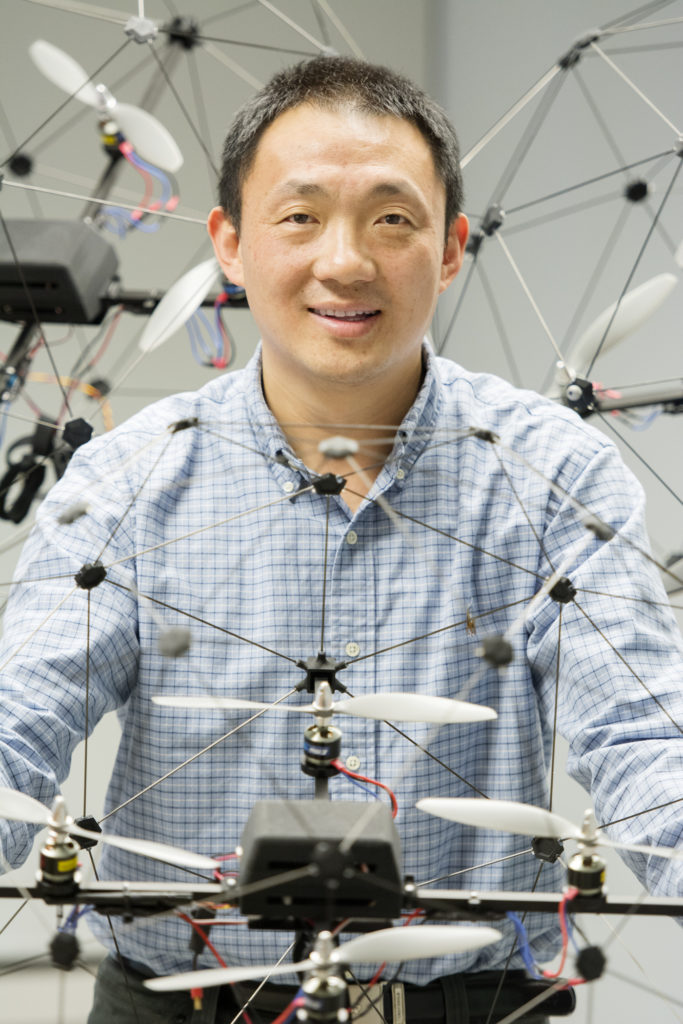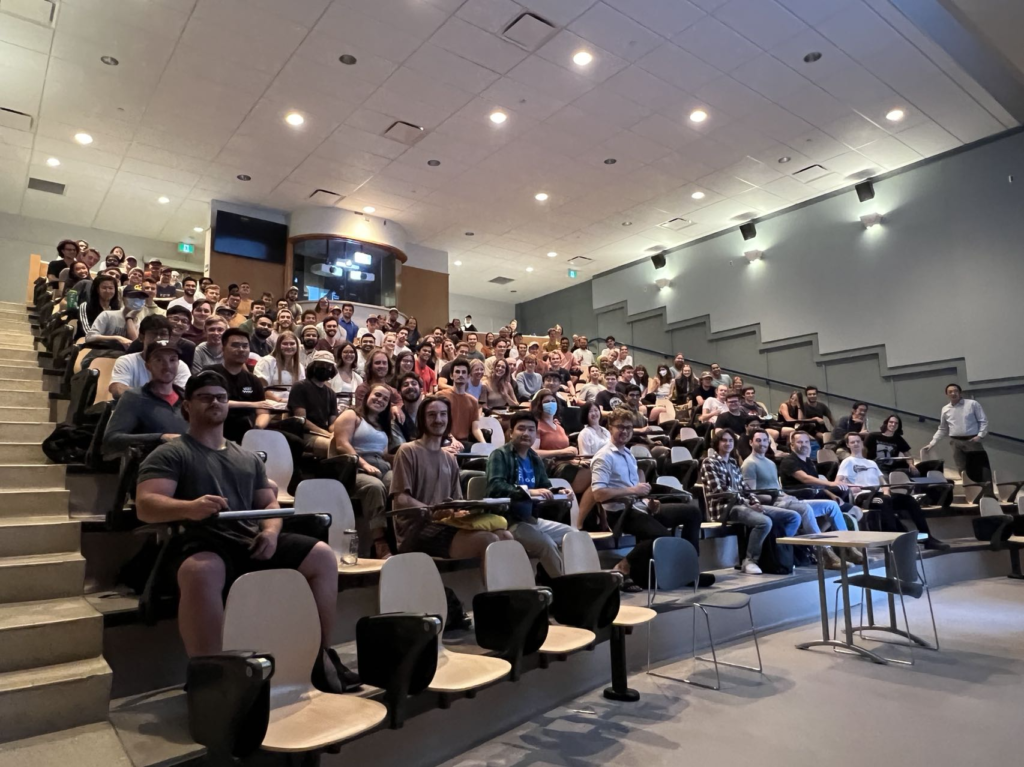Meet our Vice-President for Conference Activities, Yang Shi
Prof. Yang Shi is a multi-awarded professor, passionate for teaching, who particularly values helping students and young researchers grow. And so does he, when he handles his role as our VP Conference Activities in IES: he makes sure everyone can learn from individual and collective experiences. Learn more about Yang Shi, professionally but also personally, in this interview.
ITeN team: Dear professor, thanks a lot for being with us today, can you start by telling us about the highlights of your career?
Let me start with my education. I graduated from the Northwestern Polytechnical University, Xi’an, China in 1994 with my bachelor’s degree and then my PhD degree in 1998 in mechanical engineering and automatic control.

I worked as a research associate at Tsinghua University for two years, and then I moved to Canada. In 2005, I got my second PhD degree in Electrical and Computer Engineering. Soon after I started my career at the University of Saskatchewan from 2005 to 2009. Since 2009, I have been with the University of Victoria, where I am currently a Professor and Director of Applied Control and Information Processing Laboratory (ACIPL), Faculty of Engineering and Computer Science.
My research has been focusing on systems and control, networked and distributed control, model predictive control, and cyber-physical systems. We are particularly interested in applying the advanced control theory to emerging applications including mechatronics, robotics, industrial cyber-physical systems, autonomous marine vehicles, unmanned aerial vehicles, smart grids, etc. We have close collaborations with industry locally and internationally and some of our research outcomes have been transferred to their applications. Our theoretical research aims to enable adaptability, scalability, resiliency, and usability that can significantly advance the state-of-the-art of the above-mentioned application areas.
I have been listed as the Highly Cited Researcher by Clarivate Analytics (formerly Thomson Reuters) during 2014-2022. Some awards that I received include the University of Saskatchewan Student Union Teaching Excellence Award in 2007, the Faculty of Engineering Teaching Excellence Award in 2012 at the University of Victoria (UVic), the JSPS Invitation Fellowship (short-term) in 2013, the UVic Craigdarroch Silver Medal for Excellence in Research in 2015, the 2017 IEEE Transactions on Fuzzy Systems Outstanding Paper Award, and the Humboldt Research Fellowship for Experienced Researchers in 2018.
I highly value the education of the next generation engineers. I love teaching, both undergraduate and graduate courses. I have supervised or am currently supervising a good number of students: 26 PhD students, 26 master students, 11 postdoctoral fellows, 30 visiting scholars, and over 100 undergraduate research students and visiting PhD students. Four graduated PhDs have received tenure-track academic appointments in US/Canadian universities. My graduated students have also received some awards such as NSF Career Award, the IEEE J. David Irwin Early Career Award, NSFC Excellent Young Scholar Award, etc.

As a university professor, helping our students in their career development is one of our very important jobs besides research and teaching. I am passionate about serving professional communities, especially IEEE. I am proud to be one of the active members of the IES family.
ITeN team: Speaking of our Industrial Electronics society, since January 2022 you are also the Vice-President for Conference activities. What would be your mission in this position?
There are many tasks we need to work on to further enhance the conference activities at all levels. One of the highest priorities will be enhancing the quality of our IES conferences in terms of the following four aspects.
- First of all, the quality of the submissions.
To achieve this, we need to collaborate with our conference committee members, conference organizers, and technical committees, proactively targeting at attracting high-quality submissions. I think this is the paramount basis for ensuring the quality of the conference overall. - The second aspect refers to the quality of the review process.
Once we receive the paper submissions, we need to guarantee the highest quality of reviews. Recently, under the leadership of Juan Jose Rodriguez Andina, Antonio Luque, and other colleagues, the new conference community system platform has been further enhanced with more features and functions. It aims to provide and facilitate a unified, convenient, and user-friendly paper review and management environment for all IES conferences. We also work closely with VP Technical Activities, Technical Committee chairs and conference track chairs, providing some guidelines on the rigorous review process. Not only we need to guarantee the minimum number of review reports for each submission, but we expect to receive professional and insightful reviews. - The third one is the quality of the conference programs.
High-quality papers are the foundation of ensuring the success of a conference. On the other hand, the conference program design and development will also play an instrumental role. For example, since the last AdCom in June 2022, we have included the Industrial Forum, the Students & Young Professionals Program (S&YP) and the Women-in-Engineering Program (WiE) into the IES conference operational manual, which requires IES major conferences to organize the above three events into the conference programs. This can present a comprehensive combination of having an innovative, attractive, and cutting-edge program in the IES conference. For developing the conference programs, we also closely work with the Vice-President for Technical Activities, Valeriy Vyatkin, and with the Vice-President Industrial Activities, Stamatis Karnouskos. - The fourth aspect is to foster EDI (Equal, Diversified, and Inclusive) in all IES conferences.
Under the leadership of the conference organizers, the IES conferences always aim to provide an equal, diversified, and inclusive (EDI) environment. We hope all the participants will have an enjoyable experience besides knowledge exchange and learning new progress in the related field from colleagues.
In summary, to maintain excellence and further improve the quality our IES conferences, we are proposing detailed guidelines and suggestions for each of these four aspects. We also collect the experience and suggestions from past conference organizers so that the future conference organizers will benefit from the past successful experience.
ITeN team: Which advice(s) would you give to boost our reader’s career?
That’s a very nice question. This triggers my memory: many years ago when I was a graduate student in China, I submitted a paper to IECON by international mail. Then the review comments and decision letter were sent back via the mail, which took a long time.
My first advice for students and young professionals is to enjoy your research and work out meaningful results under the supervision of your supervisor.
Secondly, try to submit your research outcomes to leading conferences in your area (for example, IECON, ISIE, ICIT, ICPS, etc.) for peer review. When you receive the review reports, if it is not good news, don’t give up, you can improve your work, then you can make an improved version and submit it to next conference. Publishing results in a leading conference will help students gain some confidence. In addition, you can continue to extend the conference paper to a journal article after adding significant contents. Quality is the most important thing in research.
Thirdly, when attending a conference, take the opportunity to interact with colleagues and make new friends. Presentation skill is also very important for students. The IES community always provides a particularly friendly and welcoming environment. You can get some generous help and career advice from senior members. You can also participate in the S&YP Forum, WiE Forum, and Industry Forum, where you can learn the latest research progress, industry innovation and new technologies on industrial electronics.
In summary, I think my suggestion is fourfold:
- Enjoy and work hard on your research
- Publish results in leading conferences and journals
- Connect with fellow students and colleagues when participating in conferences
- Plan your future career proactively
ITeN team: Now we will talk about something more personal. Whenever, if ever, you manage to get some free time, what are your hobbies?
I like sports and I play basketball and badminton regularly. I also spend time with my sons and family. I took both of my sons to play basketball when they were 2 or 3 years old. Now my older son is a Junior (third year) studying at Harvard University and he still plays basketball when he can. My younger son, 13 years old, plays both basketball and soccer. In the summer of 2022, he won the Bronze medal in U14 basketball in BC Games, representing Vancouver Island.

Accompanying children and playing with them are always fun.
We would like to thank Prof. Yang Shi for having shared about his experience with us.
Stay tuned, we will soon interview other IES officers…

